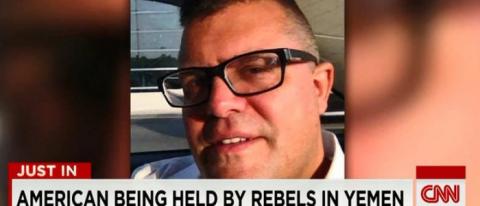Yemen's human suffering fanned by war


By the end of the month, clashes were taking place in Aden's Mualla district, forcing all residents to leave the area. Like many, Mr Sultan had no choice other than to flee with his family.
"I moved my family to Crater district, to my uncle's house. Crater had a big local market, a shopping mall and back then people there had better access to goods and services," he said.
But only a few days had passed before his office was destroyed by heavy shelling from Houthi forces, leaving him destitute.
"I have no other source of income. How can I can secure my family now?" he said.
It was only a matter of one week before Crater met the same fate as Mualla.
Houthi forces backed by some military units advanced in the city and forced their way to Crater. People had to flee the area and find shelter elsewhere.
Mr Sultan told me he saw some families fleeing the area by boat - some were relocating to other parts of Aden, while others were crossing the Gulf of Aden all the way to Djibouti, trying to escape the whole conflict zone.
Crater is the heart of Aden, with a population of more than 80,000, but today it is more like a ghost town.
The area has had no electricity, water or communications for more than two weeks now.
In a coastal city like Aden, with high levels of humidity, getting through the day without air conditioning or electricity is very hard. People have been searching for cold water or ice everywhere.
Mr Sultan was stuck for five days amid intense fighting, with a lack of food and without phone connection. "My daughter was extremely sick and there was no medical clinics open," he said, spurring him to leave.
Now he is based in Othman area, another district in Aden, and he fears the fighting might soon spread there too.
While Aden has been suffering acutely, the whole of Yemen is affected by the humanitarian crises.
According to the UN, more than 1,500 people have been killed and more than 6,200 injured by air strikes and fighting on the ground in the past two months. Many of the casualties would not have access to medical treatment.
The sharp rise in fuel prices (locals say it has gone up by six times in three weeks) has also meant the ability of ordinary people to move around or to access services has become very hard. There are also reports of huge queues at petrol stations.
As well as fuel, food is also scarce, and prices are expected to rise before long. Yemen imports 90% of its wheat and 100% of its rice.
Food reserves will soon run out and with the rise of fuel prices and restrictions to shipments coming into the country, the people who can afford to buy supplies at the moment will soon need aid or some kind of support.
A five-day humanitarian truce is under way, but the current humanitarian crisis needs much more time to resolve. Yemen needs a long humanitarian recovery programme and functioning institutions to deliver services to the people.
The UN and its partners have appealed to international donors for $237m (£150.5m) to cover Yemen's needs in the next three months, but this cannot be a long-term plan. There has not been any country that can survive solely on humanitarian aid.
BBC

Yemeni officials on Monday condemned arrests and prosecutions by the Iran-backed Houthi militia directed against media, journalists and celebrities…

Yemen's warring parties are gearing up for new waves of conflict in 2023 amid a lack of decisive steps towards sustainable peace, adding to the suf…

The UAE will help to recruit doctors and deliver crucial supplies for hospitals in Yemen under a major healthcare drive. The Khalifa bin…